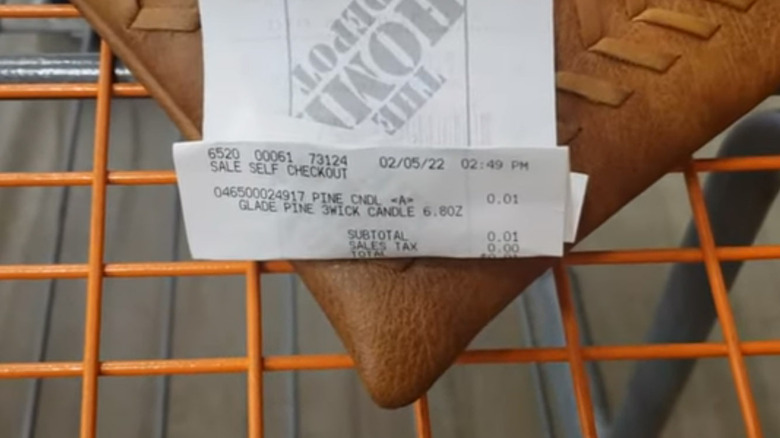Here's The Truth About Home Depot Penny Items
It's hard to ignore TikToks like this, in which a content creator purchases four 14-foot Werner Leansafe X5 ladders for four cents. The X5 is a multi-position ladder that's super-useful for safely painting stairwells, among other things, and they're usually more than $200. These so-called Home Depot "penny deals" do happen, but they don't appear to be deals at all. Instead, it's part of a write-off process that customers aren't meant to see. All the available information suggests these "penny items" are supposed to have been returned or discarded by the store but were overlooked. So the truth is, you aren't supposed to be able to buy them at all.
While you might be able to buy something at Home Depot for a penny, it may be something you think twice about putting in your cart. After all, even for a penny, that bathroom sconce still looks like the mind-erasing neuralizer from "Men in Black," and Home Depot sells far better options. That said, most "penny deals" appear to be for products a bit less impressive than ladders and sconces, like Pro Chlor septic tabs and Glade Pine Wonderland candles.
Penny deals don't really exist, but you can still get one
If you do manage to buy an item for a penny because the store's staff was unable to locate and remove that product from the shelves before you found it, Home Depot doesn't have anything to say about it publicly; the company does not publish a policy on these penny markdowns (we asked Home Depot about it but hadn't heard back as of the time of this writing). The consensus among news reports, couponing sites, and online employee forums is that these are items that Home Depot has already reported as unsold and disposed of. Still, some of these same sources can help you find penny items, including screenshots from Home Depot software showing the pricing.
Seasoned bargain hunters usually take their penny finds to self-checkout registers to avoid hassles. The reason why is apparent, as the U.S. edition of Britain's Sun newspaper reports that some cashiers might choose not to sell you a penny item you managed to find. This makes sense, as the company generally directs stores to destroy, donate, or return these products to their vendors. Thus, the self-checkout approach helps eliminate the possibility of a cashier ruining your dream of a one-cent ladder. Still, it might be less hassle and more helpful to shop for legitimate deals by watching out for clearance sales and understanding what the Home Depot's yellow tags mean.

